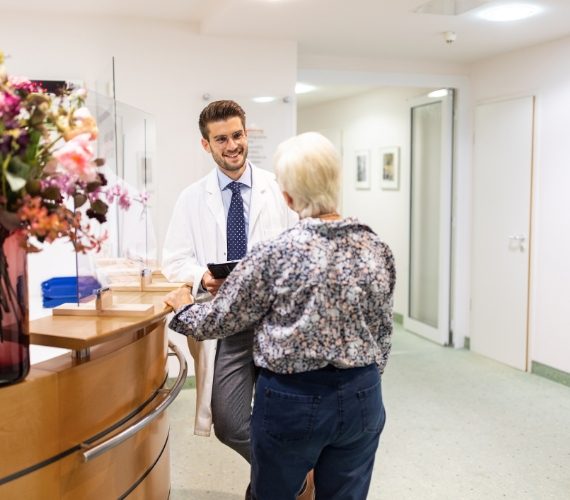Login
Surgical Care
What is Enhanced Recovery After Surgery?
Keep your pain under control.
Enhanced Recovery After Surgery Programs
Enhanced Recovery After Surgery is a care plan that helps you get back to your full health as quickly as possible. Evidence shows that patients who participate in Enhanced Recovery After Surgery programs return to their baseline function sooner than with traditional approaches.
In most cases, this innovative treatment plan will:
Important Things to Do in the Weeks Leading Up to Surgery
Eat nutritious foods
Eating a nutritious diet before surgery can also help with your recovery. Choose foods with plenty of protein, such as lean cuts of meat, chicken, fish, low-fat cheese, protein shakes, nuts and milk. If you have problems eating or swallowing, talk with your surgeon about a nutrition plan.
Important Things to Do the Day Before Surgery
After Surgery
Important Things to Do as You Recover from Your Surgery
Once your surgery is complete, the best thing you can do to is to Get up and Get Going! Your nurses will instruct you on what you need to do to, including sitting, standing and walking, deep breathing exercises, staying hydrated, chewing gum, wearing inflatable boots and doing ankle pumps and rotations to help with blood circulation.
Pain Control
Managing your pain is an important part of your recovery. ChristianaCare’s pain management program will help you have as little pain as possible, recover faster and get you back to the activities you enjoy.
Preventing and treating your pain early is easier than trying to treat pain after it starts, so we have created a plan to stay ahead of your pain. This include a combination of non-opioid pain medications, such as acetaminophen, celecoxib, ibuprofen and/or gabapentin, on a scheduled basis to reduce the amount of narcotics needed to control your pain. Treating pain with opioids alone can lead to drowsiness, lower blood pressure, lower respiratory rate, nausea and constipation.
Your nurse will regularly assess your pain level to help us keep you as comfortable as possible.
Patient Checklist
Use this helpful checklist to chart your progress. It will help you keep track of how you are feeling during your stay in the hospital and will give us important feedback to improve your experience and enhance your recovery. We are particularly looking for information about how much you are moving around, any pain or nausea you may experience and how well you are eating and drinking.
Contact Us
Call: 302-733-1000
